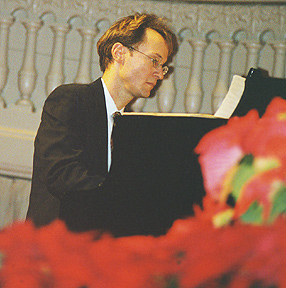Almost daily, recorded funeral hymns were broadcast over the grounds of Monte Vista, a 100-acre cemetery in the Smoky Mountains foothills town of Johnson City, Tennessee. As a four-year-old with his childhood home situated in the middle of Monte Vista, young Will Sherwood, whose father was the manager of the memorial park, began playing those funeral hymns he heard day in and day out on his family's upright piano.
"All black keys" (the key of F# Major, typically one of the most difficult keys to read from scores) fit his tiny hands just right to form the basic hymn chords and melodies. At the age of eight, his Aunt Mabel, organist at a local Presbyterian church began taking him to her church on Sunday afternoons to learn to play the pipe organ-- his feet could barely reach the pedalboard of the organ console. After a few lessons from a Baptist church's organist, as a fifth grader, he became organist at another Baptist church in 1964, and subsequently another church where his brother-in-law was minister.
Sherwood recounts the rather ecumenical tour of churches in his career: Baptist, Presbyterian, Congregational, Methodist, Trinitarian, and now for the past twenty years, Unitarian. He has learned all styles of music, from Gospel to Baroque, from A Mighty Fortress to Godspell, and has learned to work with all styles of people and environments.
Ups
and Downs, Stories to Tell
Just like
the arm motion of directing an orchestra, his performances have had a
few disasters along the way, which Sherwood took as valuable
learning experiences.
He recalls one such concert at Southwestern Baptist Church, where he was organist for 4 years while he was a high school student. To put in practice his coursework in composition and arranging, he had arranged and written orchestra parts for a variety of instrumental combinations, but had failed to allow enough rehearsal time for the amateur instrumentalists. "In front of a packed house, the result was grueling, as you might imagine," he grimaces. But he learned from this to ensure that instrumentalists were competent, knew their music, and that there was sufficient group rehearsal time.
After preparing for weeks for an organ recital at Tufts University, he arrived for the concert and warmed up as usual, and then waited for the concert's start time, which for him is the worst part of performing. At about 15 minutes past the appointed time, the administrator arrived and admitted that she had "forgotten" to publicize the concert and would need to re-schedule it. Ever since, Sherwood has been a stickler for early and thorough publicity.
Introduction to Choral Music
An hour's trip on public transportation from his college dorm in
Pittsburgh brought Sherwood to an audition/interview for his first organist-director
position. He had never conducted a choir to any extent much less conducting
from the organ console. With head and neck limbered up to give the appropriate
cues, he launched the choral part of his career, learning as he went.
Don't Throw Away Those Pipes
A
new pipe organ was being given in memory of his Aunt Mabel and the old
1917-vintage Estey instrument was being thrown out. Being the recycler
that he is, Will, assisted
by
his older brother, hauled about 20 truckloads of pipes, windchests, and
other miscellaneous "debris" to another aunt's basement. During his senior
year
in high school he rebuilt the instrument, and subsequently
it moved with him to his current Sterling residence where subsequent
alterations ensued. By the way, his weak spot still exists for adopting
ranks of pipes that
are being thrown out--
don't try to walk through his basement! The hometown pipes flank
all upper-story walls and balconies of his 3-story concert hall living
room, and are playable from a J.W. Walker 2-manual tracker instrument which
is his
pride
and
joy. He
has learned much of the pipe organ building trade by rebuilding
his own instruments.
Concert Organist
Churches
haven't been the only venue for Sherwood's music. At the age of
24, he appeared as guest soloist with the Boston Pops, and has had concert
tours in Europe as well as various concerts in the states. Fortunately
for both Sherwood and the audience, he is able to use his technical skills
to correct problems on the spot. Before one concert in Italy, the town
was experiencing a brown-out which caused the electricity to supply a lower voltage.
Several important pipes for the pieces he was playing wouldn't sound. He
was able to adjust the solenoid mechanisms to be able to respond to the
lower voltage and the concert went on! And then there was the recent wedding
in Connecticut
where two trumpet pipes ciphered (stuck) just minutes before the ceremony, and
using last week's church bulletin placed under the pipes to block the air, the processional
went on uninterrupted.
Distractions from Music
Music
has never been Sherwood's sole vocation: his multi-talented palette of
engineering, computer, and management skills keeps his calendar jammed with a plethora of competing projects. He is an engineering
manager at Intel (formerly Digital & Compaq) in Hudson, but also a
commercial photographer, neon artist, graphic designer, and web designer. Perhaps
scheduling and prioritization are his biggest challenges, but the creative
endeavors seem to get the most attention.
 Form follows Form
Form follows Form
Using "happy collisions" of ideas and cross-pollinations of themes
in art and music, Sherwood finds he can enrich tasks he is working
on by combining skills and perspectives from multiple disciplines.
For instance, music composition, graphic design, and art photography
all utilize the concept of melodic shape, harmonic textures, and rhythmic
motifs. The only difference really is the medium. The process of creating
in each medium still requires an iterative approach to refine and polish;
it's
just
the end product in the visual arts results in an artwork that is essentially
static in time and space, and music performance is temporal (and thus
requires
additional
preparation
for ensuring a perfect rendition each performance since there is only one chance with
no possibilities to go back to edit or refine).
The "First U" Years
Upon
hearing from a colleague that there was a job opening in Worcester, Sherwood
telephoned only to find out the resume submission deadline had already passed,
but nonetheless persevered to have them at least look at his background and
consider an audition. He hurried his paperwork to the church to be greeted
by the secretary, her dog by her side in the office, and landed an audition. The committee was impressed
not only by his "choir-side manner" and ability to improvise, but also
by his
pipe
organ
repair skills - a cipher happened at just the wrong time during his audition (and he disappeared into the chamber to fix),
but maybe it was just the "right" time, since he got the job with flying
colors.
He
brought organization to the music program and has expanded the palette
of First U's musical repertoire to include not only Renaissance music, but
also Gospel and Jazz; not only the Old Masters and Gregorian Chant but also
New Age and Earth-centric; not only Original Versions, but also thrilling
Descants,
Variations, and
Improvisations. He was charged with the seemingly insurmountable task of
taking a low-energy music program and breathing new life into it to put
it on the (Worcester music) map, as a way of ministering to the congregation
and the community and attracting new members. He has been a fundraiser, advocate,
and curator for the church's instruments: acquiring two Steinway "B" Grand
pianos, housing a two-manual harpsichord, and incremental improvements
to the pipe organ prior to the steeple and roof fire of 2000. The complete
rebuilding of the pipe organ has allowed the opportunity for significant
changes
and enhancements: the console was relocated back to its pre-1964 center-balcony
position along with the choir pews; the façade opening was widened
for clearer sound egress; major chamber revisions were made as well as the
addition of
new ranks of pipes and extensive refurbishing of the re-used pipes. The Æolian-Skinner
really is a new instrument to last the millennium and beyond.
See additional information about the church
fire, and organ restoration; and
details on the instrument.

